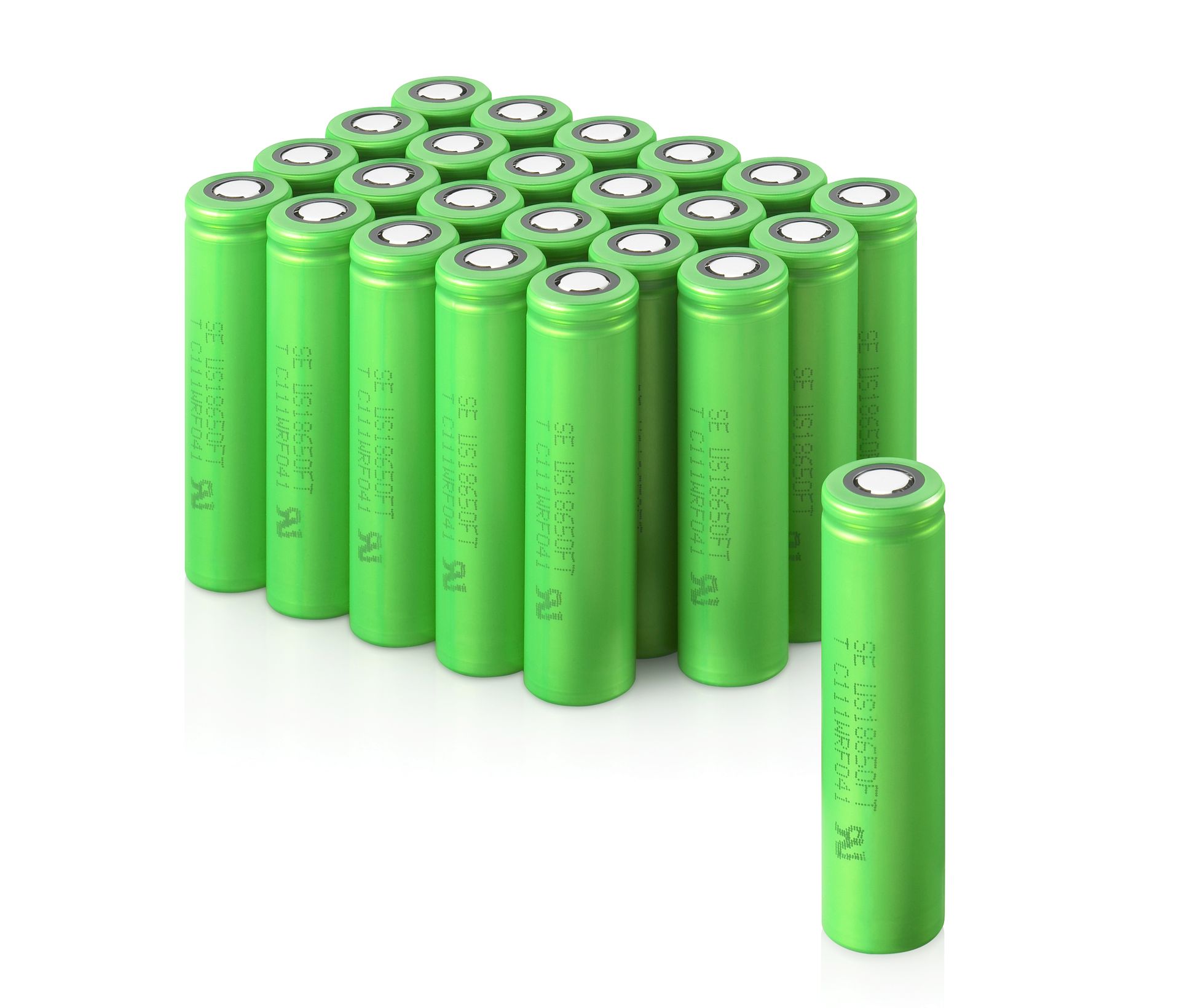Thanks to modern technology, your laptop can last for hours on end before a recharge.
No longer do you have to carry around heavy, inconvenient batteries alongside your laptop. That’s the power of lithium-ion batteries.
In this article we’ll look at lithium batteries in laptops and how to use and maintain them safely throughout their lifespans.
Here’s What You Need To Know About Laptops And Lithium Batteries
Many manufacturers use slim and lightweight lithium-ion batteries to power their laptops. Not only are these batteries powerful, but they also have longer lifespans than older batteries. They’re also safer because they do not overcharge and are extremely rare fire and explosion hazards.
Table of Contents

What Kind Of Lithium Batteries Are In Laptops?
There are two types of lithium batteries available for laptops.
- Lithium-ion
- Lithium-polymer batteries.
Lithium-ion batteries come with a liquid electrolyte whereas lithium-ion polymer batteries come with either a solid or semi-solid (gel) electrolyte. Otherwise, these batteries aren’t that different.
Both battery types have a high energy capacity and will last for extended periods of use before needing a recharge. Lithium-based batteries are incredibly safe to use, easy to charge, and will store energy for longer.
Lithium’s lightweight and malleable nature makes it the ideal battery type for use on laptops.
How Much Lithium Is In A Laptop Battery?
The ‘lithium content’ in a laptop battery isn’t necessarily a measure of how much lithium metal is present in it. Any alternative lithium-based electrolyte still counts as ‘lithium content’ and is treated as such during lithium content calculations.
Now, it’s pretty easy to work out the amount of lithium in a battery pack using the formula below:
0.3 X Amp Hour Capacity X Number of Cells
To demonstrate how it works, let’s calculate the lithium content in a laptop battery pack with six 4Ah cells. How much lithium content will it have?
0.3 X 4Ah X 6
That’s 7.2 grams of lithium.
How Long Do Lithium-ion Batteries Last?
With proper care and maintenance, lithium-ion batteries will last for up to two or three years, or about 300 to 500 charge cycles.
So, what’s a charge cycle?
For a battery to consume one full charge cycle, it has to go from 100% charge to 0% and then recharge back to 100%. We do not recommend that you charge your lithium-ion batteries in full cycles.
Emptying your battery and recharging it until full depletes the cells in your battery and reduces its otherwise long lifespan.
Can You Overcharge Lithium-ion Laptop Batteries?
You can’t overcharge lithium-ion batteries. Keeping your laptop connected to a power outlet for extended periods does not damage your lithium-ion battery either.
That’s what makes this battery type ideal for portable devices and laptops. An internal circuit inside these batteries stops them from charging further once full.
This control system makes lithium-ion batteries a bit pricier, but it also makes them safe. This safety system also prevents the lithium battery from overheating or catching fire when in use.
How Do You Charge A Lithium-ion Laptop Battery?
To charge your laptop battery, you’ll need a power adapter compatible with your device.
All you have to do is plug it into a power outlet.Once you connect the adapter to your laptop, your lithium-ion battery should begin to charge right away.
Your lithium-ion battery will charge whether your laptop is on or off. Furthermore, you may continue to use your laptop as it recharges. Active use will not slow down the charging process.
Once your lithium battery reaches full capacity, it will stop charging. Your adapter then becomes your laptop’s primary source of power until you unplug it or your state of charge reduces beyond its threshold.
You can also enable the rapid charging setting on your laptop. You’ll find this option in a custom tab in your ‘Power Options’ settings. Moreover, some laptops like Asus come with special battery software that improves the charging speed of the battery.
Such software helps you can charge your laptop fast to save time. Otherwise, let your laptop charge at a steady pace until full.
What Is The Ideal Charging Range For A Laptop With A Lithium Battery?
To ensure that it lasts long, do not let your lithium battery charge above 80% or discharge to below 40%.
Letting your battery charge or discharge to extremes reduces the life cycle of the lithium cells in your battery pack.
As we’ve seen above, your battery only has a finite number of cycles before it dies out. Keeping your battery within this charging range means that you’ll use fewer cycles to charge your battery.
Therefore, you’ll extend its period of viable use. Not only that, but you’ll also triple or quadruple the number of charges your battery can take.
How Do I Dispose Of Lithium Laptop Batteries?
Before you dispose of your dead or expired lithium-ion battery, there are some things you must understand.
- Lithium batteries contain an array of dangerous chemicals.
- Lithium batteries can be unstable and highly reactive.
Counties And States Each Have Unique Regulations And Standards On How To Dispose Of Lithium Batteries.
Ensure that you understand the regulations that govern e-waste disposal in your county or state. This will help you avoid unnecessary fines or litigation.
To Dispose Of Lithium Laptop Batteries:
- Ensure you remove the expired battery from your laptop and store it in a safe and secure location
- If you cannot remove the battery pack yourself, contact a professional technician for assistance
- Insulate all the terminals of the battery pack to prevent short-circuiting.
- Use the battery manufacturer’s recycling program to dispose of your lithium batteries safely. Companies like Asus and Lenovo have spearheaded such programs to encourage individuals and businesses to discard e-waste properly.
- You can also send your used lithium batteries to your local recycling center, use a recycling collection scheme or battery bank to get rid of them.
Here Are Some Things To Avoid:
- Don’t dispose of lithium batteries with other ‘regular’ waste materials
- Don’t puncture, crush or destroy the structural integrity of the battery pack
- Don’t store expired batteries in places with high temperatures
- Don’t mix damaged batteries with undamaged ones.
What Will Happen If The Battery (Lithium-ion) In A Laptop Is Fully Discharged To Zero?
Avoid letting your lithium-ion battery discharge to zero. Ordinarily, your laptop won’t let this happen, especially below a certain battery percentage.
However, if your lithium-ion battery discharges below its set level, an inbuilt safety circuit inside it will break, causing the battery to sleep. Once your battery is in sleep mode, even an original manufacturer’s charger cannot recharge or boost this battery.
Instead, you’ll need a battery analyzer with a boost function to even have a chance at recharging this battery.
How Do You Revive A Lithium Laptop Battery?
To revive a lithium-ion battery, you’ll need a special charger or battery analyzer with a wake-up feature or boost function.
If your charger does not have this function, it will make your battery unserviceable and you’d have to discard it. A booster applies a small amount of electrical charge that activates the safety circuit inside the battery.
If the booster gets the cell to its correct voltage, the cell will begin to charge normally.
If the voltage of the lithium-ion battery does not rise to a normal level within a minute of using a booster, safely discard that battery pack. It’s no longer functional.
How Can I Make My Lithium-ion Laptop Battery Last Longer?
Here are several things you can do to keep your battery running for longer:
Use The 40-80 Rule
Ensure your laptop battery does not charge below 40% or above 80%. Lithium-ion cells tend to experience stress at the extreme ends of charge status, and this reduces their lifespan.
Even though not inherently dangerous to your battery, manufacturers caution against leaving your computer plugged in for extended periods.
Instead, partially charge your laptop battery to about 80% capacity then disconnect your power adapter. Don’t allow your battery to fall below 40%.
You can also enable battery-regulating apps on your computer. Laptops like Lenovo, Microsoft Surface and Asus have apps or software that regulate battery charge within these limits.
Avoid Extreme Temperatures
Both ultra-high and low temperatures have detrimental effects on the lifespan of lithium-ion batteries.
Temperatures exceeding 140-degrees Fahrenheit destroy almost every component inside a battery. This degradation reduces the battery’s lifespan, leading to other associated risks such as fire and explosions.
Low temperatures, on the other hand, prevent efficient charging inside lithium cells within the battery. Keep your battery cool at all times. If your battery heats up while charging, unplug it until it cools down.
Follow Manufacturer Instructions
Read and review all manufacturer instructions before using or installing a battery on your laptop. Follow any and all instructions on charging, use and maintenance.
Prevent Physical Damage To Battery
Ensure that your laptop battery does not suffer mechanical damage such as punctures.
Besides the risk of injury damage also causes the battery to lose both its capacity and power output. Store your lithium-ion battery with care to prevent any physical damage to it.
Final Thoughts
Lithium-ion batteries are quite easy to manage. They’re a potent source of power, and they last long on singular charges. With proper maintenance techniques, your battery will last long.
Once it degrades, dispose of it in a safe and legal manner to prevent environmental pollution and hazards. Always remember to use the 40-80 rule.
Sources
https://batteryuniversity.com/learn/article/charging_lithium_ion_batteries
https://www.futurity.org/make-lithium-ion-batteries-last-longer-2284942/
https://www.simslifecycle.com/2019/05/23/guide-how-to-responsibly-dispose-of-lithium-ion-batteries/
